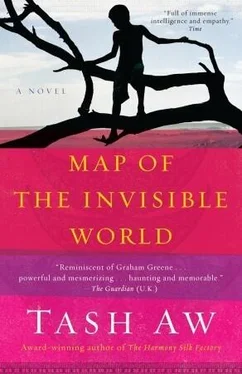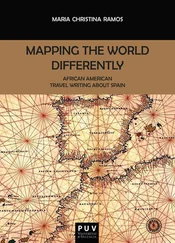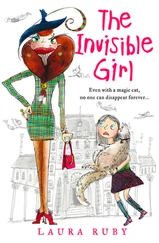Tash Aw - Map of the Invisible World
Здесь есть возможность читать онлайн «Tash Aw - Map of the Invisible World» — ознакомительный отрывок электронной книги совершенно бесплатно, а после прочтения отрывка купить полную версию. В некоторых случаях можно слушать аудио, скачать через торрент в формате fb2 и присутствует краткое содержание. Год выпуска: 2010, Издательство: Spiegel & Grau, Жанр: Современная проза, на английском языке. Описание произведения, (предисловие) а так же отзывы посетителей доступны на портале библиотеки ЛибКат.
- Название:Map of the Invisible World
- Автор:
- Издательство:Spiegel & Grau
- Жанр:
- Год:2010
- ISBN:нет данных
- Рейтинг книги:4 / 5. Голосов: 1
-
Избранное:Добавить в избранное
- Отзывы:
-
Ваша оценка:
- 80
- 1
- 2
- 3
- 4
- 5
Map of the Invisible World: краткое содержание, описание и аннотация
Предлагаем к чтению аннотацию, описание, краткое содержание или предисловие (зависит от того, что написал сам автор книги «Map of the Invisible World»). Если вы не нашли необходимую информацию о книге — напишите в комментариях, мы постараемся отыскать её.
comes an enthralling novel that evokes an exotic yet turbulent place and time—1960s Indonesia during President Sukarno’s drive to purge the country of its colonial past. A page-turning story,
follows the journeys of two brothers and an American woman who are indelibly marked by the past — and swept up in the tides of history.
Map of the Invisible World — читать онлайн ознакомительный отрывок
Ниже представлен текст книги, разбитый по страницам. Система сохранения места последней прочитанной страницы, позволяет с удобством читать онлайн бесплатно книгу «Map of the Invisible World», без необходимости каждый раз заново искать на чём Вы остановились. Поставьте закладку, и сможете в любой момент перейти на страницу, на которой закончили чтение.
Интервал:
Закладка:
Here, in the photos, he was just as Margaret remembered him: lean and deeply tanned, barefoot and wearing a sarong, often staying in the background, ceding the spotlight to his wife. Margaret had not seen her mother for ten years and wondered if she would recognize her now.
Margaret put all the photos except one back in the box and tidied the table. She picked up the newspaper article that Bill Schneider had given her, looking at it once more under the magnifying glass. It didn’t help. The picture only became fuzzier, its indistinct dots revealing no further clues. There was one white man in the crowd of twenty Indonesian ones, that was for sure. They were in a cell, or the back of a dark room. The flash of the camera had surprised a few of them; their faces were raised open-mouthed and dazed, looking straight at the viewer. The others just sat cross-legged, their heads bowed to their chests. Right at the back, the solitary white figure sat calmly with his back propped up against the wall, his head turned at an angle as if examining something on his leg. A small part of his neck was revealed, like a fragment of a precious mosaic. Margaret studied it at length; the slight curve of it was unmistakable — or was she just imagining the similarity? She had spent most of the night comparing the photo in the newspapers to her old photos but could not reach a conclusion.
The streets were already teeming by the time she stepped out into the dusty sunlight. Along the shady lanes near her house the drains were no longer overflowing but filled with shallow puddles of oily water, blocked by dams of rubbish rotting slowly in the heat. Two mangy dogs picked listlessly through the tangle of tin cans and empty sacks and vegetation as Margaret walked past a row of shops, their bamboo blinds lowered against the sun. A hundred and fifty years ago, when Dutch Batavia was at its zenith, these shops contained bags of spices and tea and fragrant wood bound for Europe, where there was no limit to their prices; this was the port from which European fantasies were stoked to frenzied extremes, but you could sense none of the past glory in the streets of Old Jakarta. The voices of prosperous merchants did not echo in the narrow lanes, the clink of gold coins had disappeared a century ago. Even in the south of the city, in the place that some people called “New” Jakarta, Margaret could see only decay. She had witnessed its growth, the simple, functional houses built seemingly overnight, stretching in rows like crops, punctuated by enclaves of big houses, where the roads suddenly widened and high cement walls hid immense Western-style mansions, the bright terra-cotta tiles on their faux-Tuscan roofs just visible above the walls. But everything aged so quickly here, Margaret thought; Jakarta had a way of dragging everything into its slimy mess, of making new things look old. Moss grew on surfaces of smooth cement; the sun and the rain wore down metal and stone and made them look dirty. In Jakarta she could never really escape the feeling of being in a slum.
She wandered into the square ringed by the last of the great buildings of old Batavia, stumbling slightly on the remnants of the cobblestones. She flagged down a jeep taxi in front of the porticoes of the once-handsome, almost-derelict old city hall, watched by a group of soldiers who huddled in the shade of a wooden lean-to, sharing a kretek between them. “Hey, lady, got a cigarette?” one of them shouted out without much enthusiasm, as if anticipating Margaret’s cursory shake of the head. She knew he wanted Marlboros or Camels, proper cigarettes, not the cheap kretek he and his friends were smoking. Not long ago she’d always carried a pack of Lucky Strikes with her. You could bribe anyone with American cigarettes. That was the curious thing about the human animal, she thought: Even in times of famine they would sooner reach for luxuries than a sack of rice. A stick of tobacco laced with noxious chemicals was worth more than a meal for a child, that was why she’d always had cigarettes with her, but they had become so difficult to buy, so expensive, even for a foreigner.
The jeep jerked its way through the traffic, heading slowly south to the heart of modern Jakarta. The weather was on the turn now: The damp air of the monsoon season was beginning to blow into the city, the risk of heavy thunderstorms growing with each week. For the past few months the winds had been dry and dusty, the moisture bleached from the city, every object like tinder, ready to catch fire. Sometimes the air was so dry it was hard to believe that this city lay on the coast of a tropical island. The flimsy houses in the slums they now passed reminded Margaret of dead leaves on a bonfire, heaped up on top of one another, waiting for a single match or smoldering cigarette butt. There were always fires in the slums in the dry season, and every week for the last three months she had passed the blackened remains of houses, charred fragments of timber and corrugated iron, that just lay there, day after day, becoming part of the cityscape. And yet in a few weeks’ time they would be damp and slimy from the blocked drains and the pools of stagnant gray water that collected after the rains, and Margaret would forget the desiccating heat of August. How quickly we forget, she said to herself, how quickly we forget.
“Stop here, please,” she called out. The taxi shuddered to an abrupt halt outside one of the smart, modern buildings on the fringes of the newly laid out Merdeka Square. The giant rectangular box made from smooth gray concrete had shiny glass in the windows and a facade of fashionable honeycomb shapes. Air conditioners hummed faintly behind closed doors as she crossed the immense foyer, her sneakers squeaking on the shiny terrazzo floor. Behind a semicircular desk a security guard dozed in his chair, his head hanging limply to one side, his hands clutching a thin exercise book to his belly. There was no one else around; a solitary swallow fluttered aimlessly against the vaulted ceiling, desperately trying to find its way back out of the building. Margaret continued until she reached the back door, reemerging into the heat. In the shadow of the big, new building stood an older, smaller one, its timber upper floor giving it the air of a village house. There was hardly any space between the two structures — no lawn or yard, just a narrow drain. Typewriters clacked without enthusiasm in the stillness of the afternoon as Margaret went up the creaky wooden stairs. The radio was on, broadcasting one of the president’s speeches — a repeat, Margaret noticed — his voice urgent, persuasive, utterly convincing. There were a few men in the room at the top of the stairs, two of them hunched over typewriters, the others napping in flimsy reclining chairs or on canvas cots. The shutters were open but here in the shadow of their enormous neighbor there was never much light, just a perpetual gloom.
“Hello, Sailor,” she said.
“My dear god,” one of the men said, leaning back in his chair, “it’s Jakarta Jane, sweetheart of the forces. To what do we owe this most splendid honor?”
“Nothing, just thought I’d pop by to say hello,” Margaret said, easing herself into a chair.
“I’ve never known Margaret Bates to ‘pop by’ to say hello. What do you want?” He had an open smile, his youthful face surprisingly creased with lines. He was a stocky man with broad, hairy forearms and thick farmer’s fingers that looked thoroughly unsuited to writing or typing.
“Do I detect a note of cynicism there, Mick?”
“Not a note, a whole goddamn symphony. Rudy — get Margaret a beer, will you? And one for yourself too. In fact, one for everyone. We need no further excuse for a beer now that Margaret Bates is here.”
The other man, a stout young Indonesian, retrieved three bottles of Krusovice from a fridge that stood against a bare wall like a piece of modern art. He brought one over to Margaret, bowing slightly as he did so.
Читать дальшеИнтервал:
Закладка:
Похожие книги на «Map of the Invisible World»
Представляем Вашему вниманию похожие книги на «Map of the Invisible World» списком для выбора. Мы отобрали схожую по названию и смыслу литературу в надежде предоставить читателям больше вариантов отыскать новые, интересные, ещё непрочитанные произведения.
Обсуждение, отзывы о книге «Map of the Invisible World» и просто собственные мнения читателей. Оставьте ваши комментарии, напишите, что Вы думаете о произведении, его смысле или главных героях. Укажите что конкретно понравилось, а что нет, и почему Вы так считаете.












